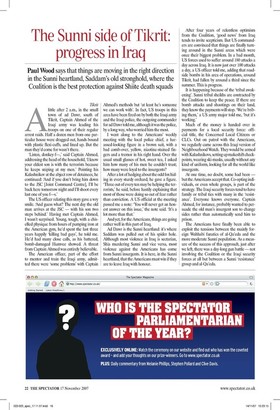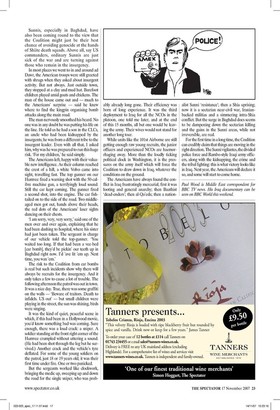The Sunni side of Tikrit: progress in Iraq
Paul Wood says that things are moving in the right direction in the Sunni heartland, Saddam's old stronghold, where the Coalition is the best protection against Shiite death squads Tikfit Alittle after 2 a.m., in the small town of ad Dawr, south of Tikrit, Captain Ahmed of the Iraqi army was leading his troops on one of their regular arrest raids. Half a dozen men from one particular house were dragged out, hands bound with plastic flexi-cuffs, and lined up. But the man they'd come for wasn't there.
'Listen, donkey-f—,' said Captain Ahmed, addressing the head of the household, 'I know your eldest son is with the terrorists because he keeps sniping at my men.' Pointing his Kalashnikov at the abject row of detainees, he continued: 'And if you don't bring him down to the JSC [Joint Command Centre], I'll be back here tomorrow night and I'll shoot every last one of you f—s.'
The US officer relating this story gave a wry smile. And guess what? The next day the old man arrives at the JSC — with his son two steps behind.' Having met Captain Ahmed, I wasn't surprised. Young, tough, with a chiselled physique from hours of pumping iron at the American gym, he'd spent the last three years happily 'killing bad guys', he told me. He'd had many close calls, as his battered, bomb-damaged Humvee showed. A threat from Captain Ahmed was entirely believable.
The American officer, part of the effort to mentor and train the Iraqi army, admitted there were 'some problems' with Captain Ahmed's methods but 'at least he's someone we can work with'. In fact, US troops in this area have been fired on by both the Iraqi army and the Iraqi police, the outgoing commander for ad Dawr told me, although it was the police, by a long way, who worried him the most.
I went along to the Americans' weekly meeting with the local police chief, a harassed-looking figure in a brown suit, with a bad comb-over, yellow, nicotine-stained fingers and a tremor in his right hand. Over the usual small glasses of hot, sweet tea, I asked him how many of his men he couldn't trust; how many were loyal to the insurgents?
After a lot of hedging about the odd fox hiding in every sturdy orchard, he gave a figure. 'Three out of every ten may be helping the terrorists,' he said, before hastily explaining that most of those were doing so out of fear rather than conviction. A US official at the meeting passed me a note: 'You will never get an honest answer on this issue,' the note said. 'It's a lot more than that.'
And yet, for the Americans, things are going rather well in this part of Iraq.
Ad Dawr is the Sunni heartland: it's where Saddam was pulled out of his spider hole. Although most violence in Iraq is sectarian, Shia murdering Sunni and vice versa, most violence against the Americans has come from Sunni insurgents. It is here, in the Sunni heartland, that the Americans must win if they are to leave Iraq with honour.
After four years of relentless optimism from the Coalition, 'good news' from Iraq tends to invite scepticism. But US commanders are convinced that things are finally turning around in the Sunni areas which were once their biggest problem. In a bad month, US forces used to suffer around 180 attacks a day across Iraq. It is now just over 100 attacks a day, a US officer told me, adding that roadside bombs in his area of operations, around Tikrit, had fallen by around a third since the summer. This is progress.
It is happening because of the `tribal awakening'. Sunni tribal sheikhs are contracted by the Coalition to keep the peace. If there are bomb attacks and shootings on their land, they know the payments will stop. 'We're bribing them,' a US army major told me, 'but it's working.'
Much of the money is handed over in payments for a local security force: official title, the Concerned Local Citizens or CLCs. Out on patrol with the Americans, we regularly came across this Iraqi version of Neighbourhood Watch. They would be armed with Kalashnikovs, setting up makeshift checkpoints, wearing ski-masks, usually without any kind of uniform, looking for all the world like insurgents.
At one time, no doubt, some had been — but the Americans accept that. Co-opting individuals, or even whole groups, is part of the strategy. The Iraqi security forces tend to have family or tribal ties with many in the 'resistance'. Everyone knows everyone. Captain Ahmed, for instance, probably wanted to persuade the old man's insurgent son to change sides rather than automatically send him to prison.
The Americans have finally been able to exploit the tensions between the mainly foreign Wahhabi fanatics of al-Qa'eda and the more moderate Sunni population. As a measure of the success of this approach, just after we left, there was a day-long gun battle — not involving the Coalition or the Iraqi security forces at all but between a Sunni 'resistance' group and al-Qa'eda.
Sunnis, especially in Baghdad, have also been coming round to the view that the Coalition might just be their best chance of avoiding genocide at the hands of Shiite death squads. Above all, say US commanders, ordinary Sunnis are just sick of the war and are turning against those who remain in the insurgency.
In most places we went to in and around ad Dawr, the American troops were still greeted with shrugs when they asked about insurgent activity. But not always. Just outside town, they stopped at a clay and mud hut. Barefoot children played amid goats and chickens. The man of the house came out and — much to the Americans' surprise — said he knew where to find the kingpin organising bomb attacks along the main road.
The man nervously smoothed his beard. No one was in any doubt he was putting his life on the line. He told us he had a son in the CLCs, an uncle who had been kidnapped by the insurgents; he was from a different tribe to the insurgent leader. Even with all that, I asked him, why was he was prepared to run this huge risk. 'For my children,' he said simply.
The Americans left, happy with their valuable new intelligence. As their column reached the crest of a hill, a white Volvo came into sight, travelling fast. The top gunner on our Humvee fired a warning shot with the 50-calibre machine gun, a ten-ifyingly loud sound. Still the car kept coming. The gunner fired a second shot, into the engine. The car fishtailed on to the side of the road. Two middleaged men got out, hands above their heads, the red dots of the Americans' laser sights dancing on their chests.
'I am sorry, very, very sorry,' said one of the men over and over again, explaining that he had been dashing to hospital, where his sister had just been taken. The sergeant in charge of our vehicle told the top-gunner. 'You waited too long. If that had been a vee-bed [car bomb], they'd be pickin' our teeth up in Baghdad right now. I'd 'ave lit 'em up. Next time, you wax 'em.'
The risk to the Coalition from car bombs is real but such incidents show why there will always be recruits for the insurgency. And it only takes a few to cause a lot of trouble. The following afternoon the patrol was out in town. It was a nice day. True, there was some graffiti on the walls — 'Beware of traitors. Death to infidels. US out' — but small children were playing in the street, the sun was shining, birds were singing.
It was the kind of quiet, peaceful scene in which, if this had been in a Hollywood movie, you'd know something bad was coming. Sure enough, there was a loud crack: a sniper. A soldier standing at the front right corner of the Humvee crumpled without uttering a sound. (He had been shot through the leg but he survived.) Another crack and the vehicle's tyre deflated. For some of the young soldiers on the patrol, just 18 or 19 years old, it was their first time under fire. One or two panicked.
But the sergeants worked like clockwork, bringing the medic up, sweeping up and down the road for the single sniper, who was probably already long gone. Their efficiency was born of long experience. It was the third deployment to Iraq for all the NCOs in the platoon, one told me later, and at the end of this 15 months, all but one would be leaving the army. Their wives would not stand for another long tour.
While units like the 101st Airborne are still getting enough raw young recruits, the junior officers and experienced NCOs are haemorrhaging away. More than the loudly ticking political clock in Washington, it is the pressures on the army itself which will force the Coalition to draw down in Iraq, whatever the conditions on the ground.
The Americans have always found the con flict in Iraq frustratingly mercurial; first it was looting and general anarchy; then Baathist 'dead-enders'; then al-Qa'eda; then a nationalist Sunni 'resistance'; then a Shia uprising; now it is a sectarian near-civil war, Iranianbacked militias and a simmering intra-Shia conflict. But the surge in Baghdad does seems to be dampening down the sectarian killing and the gains in the Sunni areas, while not irreversible, are real.
For the first time in a longtime, the Coalition can credibly claim that things are moving in the right direction. The Sunni vigilantes, the divided police force and Rambo-style Iraqi army officers, along with the kidnapping, the crime and the tribal fighting: this is what victory looks like in Iraq. Next year, the Americans will declare it so, and some will start to come home.
Paul Wood is Middle East correspondent for BBC TV news. His Iraq documental), can be seen on BBC World this weekend.





































































 Previous page
Previous page